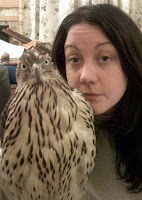I must confess that I picked this book up more than once in the bookshop over a couple of months. I was curious, but... I was not really optimistic. I was expecting brutality, gut-wrenching sadness and I don't know what else. And superficially, the butt-ugly cover didn't help much either.

Set in modern South Africa,
Black Dog Summer follows a mother who was brutally murdered in a farm massacre. If that doesn't make sense, think of
The Lovely Bones by Ann Sebold. From her place in the ether, she watches over her daughter, her sister and her niece, as they come to terms with guilt, loss and the expectation to continue living.
Black Dog Summer does a very good job of showing South Africa as it is today. The integration (yay! things are improving!), and the horrific acts of violence and the effects it has (but some shit never changes). For that alone it was really interesting. One of my concerns when picking this up, was that the violence would be explicit. It wasn't. Well, at least not in the way that I feared it might.
"'Fear is an instinct that is there to protect you,' Lesedi says. 'But, like all of us, you need to ask yourself if you're fearing the correct thing, or ignoring the truth because you think you already know how the world works. It's so easy to decide that a familiar thing is harmless and a strange new thing is bad, but...'"
- Miranda Sherry, Black Dog Summer
There was one passage where I absolutely adored the language, when Gigi went to school on the her first day, and compared all the girls to impalas. I really thought it was a beautiful metaphor, and showed not only the way the girls flicked their hair and carried themselves, but also showed a deep love of animals. In some way, I felt it really captured South Africa.Wait, let me find it for you:
"The girls look like a herd of impalas, ... , all brown coats and slender ankles with long hair to flick instead of tails. They know that I am not one of the herd and look at me with little sideways movements of their eyes like my coat is not quite the right brown, or my ponytail is tied up wrong. Maybe they think I am a jackal in disguise or something. Up close, they stink of ten different kinds of deodorant and shampoo and sweat all mixed into a horrible stew."
- Miranda Sherry, Black Dog Summer
I liked how she did the characters too. The adults and the two girls really came across as well-fleshed out characters. I felt for them, was concerned for them, or disliked them (as was intended). I could really talk a lot about these characters, but I will leave that for you to discover all on your own, without my interference. There was a lot of diversity too, and through that, aspects of the traditional cultures were also covered (along with the question of how to integrate that into a modern Africa).
I gave this 4 stars on Goodreads, and I will say that more than a month later, I still have fond memories of reading this. I would recommend this for folks interested in South Africa, readers who like contemporary novels, or those who are looking for authors who are not from the US or UK for their reading stats.
 North is a circus girl, who lives on a circus boat, and who performs with a bear. She is required to marry a young man she doesn't even like. Callanish is a girl with secrets who is left repenting for something as a Gracekeeper, a water-world version of an undertaker. She was originally from the land. This book covers their lives.
North is a circus girl, who lives on a circus boat, and who performs with a bear. She is required to marry a young man she doesn't even like. Callanish is a girl with secrets who is left repenting for something as a Gracekeeper, a water-world version of an undertaker. She was originally from the land. This book covers their lives.















